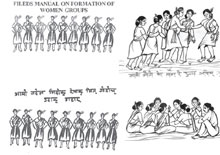Case Studies of entrepreneurs
Occupational and entrepreneurial case studies of 20 successful tribal women entrepreneurs describing their life cycle including skills, experience, shocks, challenges and access to productive resources have been produced for providing glimpses of policy advocacy to financial institutions, planners, government and civil society as a part of advocacy case studies of “Representative successful tribal women entrepreneurs”
32 year old Churki Soren is an empowered woman today, nominated by her self help group and villagers to fight for panchayat elections in Murbhanga PO. This is no mean feat for an anganwadi teacher earning Es. 500/- per month, belonging to a farmer family.
Secretary of the Hopon Marsal Self Help Group, she has attended training sessions conducted by ICPRD in Dumka which helped develop her capacities. “I learnt from members who went on a ICPRD Exposure Visit to Kolkatta about various livelihood options. This is how I started cultivating potatoes,’ says Churki.
She owns 3-4 bigha (1 acre) land on which she cultivates paddy, maize, arhar (lentil) for the consumption of the family only.
She has taken loans from the group 4 times. She started potato plantation with a Rs. 1000/- loan from the group. ‘I invested the entire amount for potato cultivation. I had a rich crop,’ she says.
Along with potatoes, she also planted onions, tomatoes, brinjal for consumption purpose but she had a good crop of tomatoes which she sold and earned Rs. 1000/- in kurum, Gando and Chirudih haats or fairs.
‘What I need now is a well so that I can cultivate more and improve my livelihood. I got this idea of expanding my enterprise in this way through ICPRD and RTDF (Rural Tribal Development Foundation),’ says Churki. |
Churki Soren, Sahargatti Village, Dumka |
 Translation of tools in local Santhali or tribal language Translation of tools in local Santhali or tribal language
As a first for India, in its micro-finance advocacy campaign in Jharkhand, ICPRD facilitated the preparation, in local Santhali language, of its field training manual on SHG group formation to reintegrate tribal women into financial institutions. The manual for management of tribal women’s groups has pictorial representation of social mobilization concepts to reach out to the tribal women.
To link them to the formal banking system, ICPRD also facilitated the preparation of SHG Bank linkage forms and other necessary banking formats in Santhali language as promotional ventures.
Establishment of sustainable linkages of SHGs with banks
The Banks with which linkages have been established for SHG groups are the State Bank of India, Grameen Bank, Allahabad Bank and NABARD. Partner NGOs have facilitated the process of linking SHG groups with formal banking institutions and ICPRD has acted as a facilitator through translation of the “SHG Bank linkage form” in Santhali language, which is a ‘first’ for India.
The income generation activities for which loans were availed are:
- Agarbatti making
- Rice
- Wheat Flour
- Beauty embellishments for women
- Bamboo items
- Agriculture
- Vegetable cultivation
- Murhi making and selling
- Cattle
- Pig, Goat and Poultry
- Tea Stall
- Indian sweets
- Woolens
- Brick making
- Fishery
<<PREVIOUS NEXT >> |



